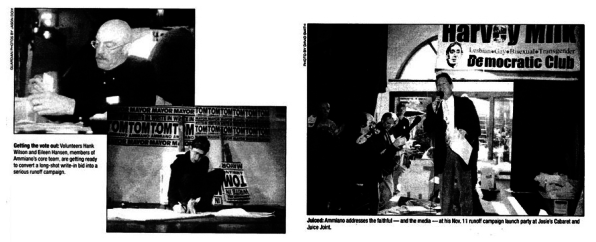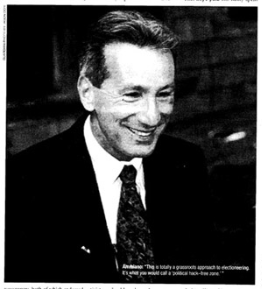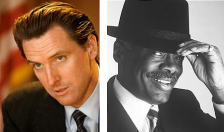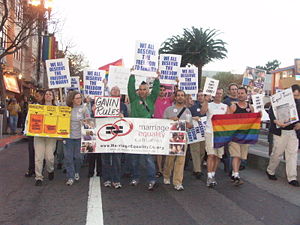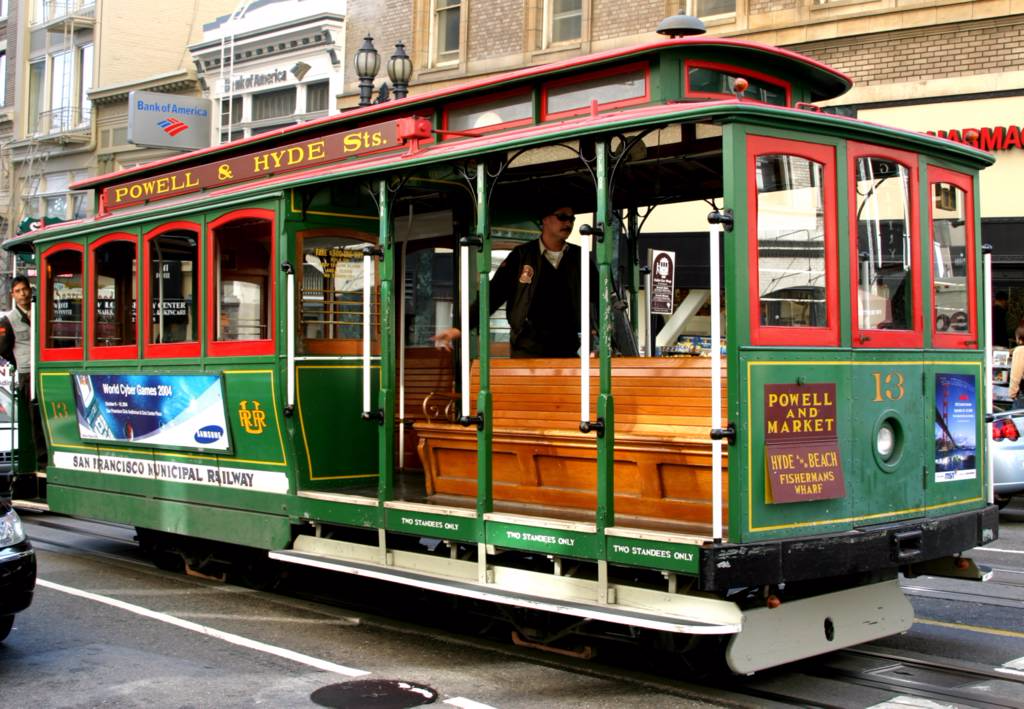San Francisco Bay Guardian - November 10, 1999 Pgs. 24-25, 27
Ammiano's Miracle
How Tom Ammiano could win the mayor's race -- and what might happen if he does
By Savannah Blackwell and Gabriel Roth
This might never have happened.
With less than a month to go before the election, Sup. Tom Ammiano emphatically told the Bay Guardian he wasn't going to sign up to be a write-in candidate for mayor.
For much of the year, progressives had pinned their hopes on Ammiano entering the race. Activists made buttons reading "Run, Tom, Run." This newspaper publicly called on the supervisor -- one of the few board members to remain independent of the mayor, and the only consistent progressive vote -- to throw his hat in the ring.
Ammiano chose not to put his name on the ballot -- and even in early October, he told us he wouldn't file to be a write-in candidate. Voters would have to choose between Willie Brown, Frank Jordan, and Clint Reilly. One month later, after a historic upset victory that has turned a depressing campaign into an incredible opportunity, everybody wants to know: How did this happen? Does Ammiano really have a shot at unseating San Francisco's own Slick Willie? And if by some incredible chance he makes it... what then?
Explosion of energy
Despite Ammiano's public reluctance to enter the race, longtime activists refused to give up hope. Hank Wilson, who helped found the Harvey Milk Lesbian/Gay/Bisexual/Transgender Democratic Club more than two decades ago, set up a booth at the Folsom Street Fair Oct. 9 and 10 to solicit support for an Ammiano write-in campaign. By Oct. 12, Ammiano was quietly telling a few close supporters that he was going to jump in -- mostly to get out the vote for a few ballot initiatives (the Laguna Honda bonds, the ATM fee ban, the Sunshine Initiative, and the last nail in the Central Freeway's coffin, all of which passed handily). Two days later, he announced officially. By Oct. 15, he told us he wanted to be mayor.
At that point, political analysts didn't think he had a shot at getting into the runoff. San Francisco pollster David Binder predicted Ammiano would garner no more than 12 percent of the vote.
"My initial thoughts were that there was not a lot of enthusiasm," Binder told the Bay Guardian. "I didn't sense there would be enough energy to spread to a wider group."
Binder, like a lot of observers, was wrong. It turned out there were plenty of voters eager to say "enough" to a mayor who is both self-serving and beholden to big business. And after months of campaigning by Brown and his two lackluster challengers - a deposed former mayor and a political consultant with no record in office -- Ammiano's last-minute entrance came as a breath of fresh air. Even the daily newspapers, both of which endorsed Brown, gave Ammiano upbeat coverage.
A volunteer army
But few were prepared for what happened next. Twenty-four hours after they learned they had a candidate, Wilson and tenant activist Robert Haaland had turned out 70 people to walk the precincts. By Oct. 18 -- four days after the campaign officially began -- they had handed out some 50,000 flyers showing where to write Ammiano's name on the ballot. By Election Day, Haaland and Wilson were heading an army of 2,000 volunteers. The campaign had exploded.
Part of the reason for that is Ammiano himself. After nearly a quarter-century in public life -- as an activist, a school board member, a supervisor -- he has repeatedly demonstrated his integrity. What's more, he is exactly how he presents himself: a likable, sympathetic person who lives on a relatively low income and takes public transit to work.
The people who volunteered for him "think he has a genuine interest in making things better here, in making it so that a lot of us can continue to live here," Milk Club president Criss Romero told the Bay Guardian. "It's his sincerity and level-headed compassion."
But Ammiano's campaign tapped into something bigger that the candidate himself: a sense of possibility, a hope that grassroots democracy could win out over slick machine politics and big money.
That hope paid off. Reilly spent nearly $4 million of his own money. Brown spent $2.3 million in contributions, mainly from special interests, while his allies backed him with more than half a million dollars in soft money. Jordan's $327,000 was routinely derided in the press as insufficient.
Ammiano took second place, with 25 percent of the vote. His campaign spent $25,000.
"What with all of Willie Brown's soft money and Reilly's big spending, the energy we're getting is because people are so excited that a campaign can be successful without all that," Wilson told us. "It was a statement about how we should be solving our problems, which we can't do in a system paralyzed by the interests of big money."
Declaring early
Going into Election Day, Ammiano supporters were confident -- so confident that many dismissed their predictions as foolish. But Binder had conducted a poll the previous weekend that found Ammiano at 20 percent, Brown at 31 -- and, as Binder told us election night, he "asked the question [about Ammiano] three different ways, to see if his support was real or soft."
At Ammiano's Castro headquarters, political consultant and supporter David Spero was predicting an Ammiano-Brown runoff at 8:30 p.m. -- long before the Department of Elections had released the first ballot count. How did he know?
It wasn't just guesswork or hope. Ammiano poll watchers and supporters had seen the workers separate write-in ballots from non-write-ins at dozens of precincts. In Ammiano's core area, Spero heard the candidate was taking 70 to 80 percent of the vote. And news was good from the rest of the city as well. Forty percent of voters in a North Beach precinct had written Tom in; so had 35 percent in a Richmond neighborhood. The anecdotal evidence was promising as well. A lot of people had pens in their hands at the polls.
Spero rode the tide of optimism until about 4 a.m. Wednesday morning when Binder emerged from City Hall to report that Jordan and Ammiano were running neck and neck.
All day Thursday, Ammiano supporters were nervous. Even Haaland, who told us he had a gut feeling from the start that Ammiano would make the runoff, was worried Jordan might edge ahead. That's why emotions ran so high in the North Light Court of City Hall when Department of Elections director Naomi Nishioka announced that Ammiano would face Brown in the runoff.
"It was magic," Haaland said. "We had the magic formula. We had a network of community activists to draw from in the beginning, and then it just exploded. And the reason all these people were drawn to the campaign is because it is one they can trust. It's real. It's grassroots. And it's the truth. He pulled it off."
Pulling votes
Ammiano says that same power can work for him in the runoff.
"This is totally a grassroots approach to electioneering," he told us. "It's what you would call a 'political hack-free zone.'"
After months of public wavering, Ammiano says he's now taking the possibility of winning very seriously.
"I think we have a very good shot," he said. "The mayor is formidable. The money is formidable. But the way this whole idea has caught fire and propelled me into the runoff -- it would be remiss to dismiss the possibility."
Ammiano's remarkable campaign won him almost 46,000 votes -- a stunning amount for a write-in candidate and a comfortable lead over Jordan, but not enough to get close to Brown. The incumbent ended the election with 71,000 votes -- a 25,000-vote lead.
So the runoff hinges on two questions: Can Ammiano make up that deficit, and can Brown attract any more support between now and Dec. 14?
The first votes Ammiano can look to pick up are from voters who back Brown's other challengers in the Nov. 2 election. Former mayor Jordan is more conservative than Brown, which will make it tough for Ammiano to attract his voters. But jordan respects Ammiano's integrity and independence, and he has been making noises in the press about the possibility of giving Ammiano his endorsement. The former mayor is set to meet with Ammiano next week.
It's not clear whether Jordan will make a formal endorsement -- but he certainly won't be endorsing Brown. Mark Foehr, Jordan's press secretary, told us Jordan "understands Tom is very sincere and cares deeply about the city. Willie Brown he sees as out for himself."
Jordan pulled some 30,000 votes last week. Faced with a choice between an imperial incumbent who calls himself a liberal and an independent progressive, half of those 30,000 voters will probably stay at home and skip the runoff; maybe 15,000 will turn out to the polls. If Ammiano does get Jordan's endorsement, he might expect to attract two-thirds of them -- giving him 10,000 Jordan voters and Brown the other 5,000. For Ammiano, that's a net gain of 5,000 votes.
Clint Reilly, the political consultant who ran on a progressive, pro-neighborhoods platform, took 23,000 votes. Most of those voters are expected to return to the polls; lets assume all but 2,000 vote for either Brown or Ammiano. According to Binder, Ammiano can expect to pull five-eighths of those votes; the rest go to Brown. That gives Ammiano 13,000 and Brown 8,000 -- a net gain of another 5,000 for Ammiano.
To pick up Reilly's and Jordan's voters, Ammiano will have to enlarge his support from the city's more conservative west-side districts. Voters there will likely be put off by his unabashed liberal politics -- and by campaign mail from Brown and his downtown allies presenting misleading information about the progressive taxation package Ammiano proposed in his first term as a supervisor.
But it's worth remembering that Ammiano drew support from all over the city when he was elected board president last year and collected 120,000 votes -- despite a well-financed smear campaign.
The city's conservatives already hate Brown for his machine politics and backroom deal making. Some may have voted for Ammiano to send the mayor a message -- but if they're faced with a tight runoff, they might stick with the devil they know. They might just stay home. Or they might vote for Ammiano for the same reasons progressives in the past have backed former State Sen. Quentin Kopp -- his honesty, integrity, and independence.
Between them, 11 less well known candidates, led by Martin Eng and Lucrecia Bermudez, took almost 12,000 votes Nov. 2. Few of their supporters will be inclined to vote for Brown in the runoff. Making allowances for a lower turnout, Ammiano might expect to take some 8,000 of those votes, with almost none going to Brown.
Those projections, which may be optimistic, bring Ammiano 18,000 votes closer to Brown -- not close enough for comfort, but certainly within striking distance. But even if Brown can't attract one more voter between now and the runoff, Ammiano needs another 7,000 votes. Those will have to come from people who didn't vote at all in November.
Gearing up for a fight
Ammiano has one huge advantage that he didn't have for his Election Day miracle: his name will appear in the ballot. The volunteers registering voters and knocking on doors for Ammiano no longer need to teach voters how to spell his name and where to write it. But his supporters have to bring more people -- a lot more people -- to the polls.
It's a strategy they're already putting into practice. By Nov. 8 -- less than a week after the election -- Ammiano backers had registered 1,700 new voters from all over the city. "We're trying to get at least 5,000," Haaland said. There isn't a lot of time, though -- the deadline to register is Nov. 15. (For information on how to register, see page 24.)
"They're doing the right thing by trying to register new voters," Harry Britt, the heir to Harvey Milk's seat on the Board of Supervisors who served as board president in the 1980s, told us. "That's always been the heart of progressive politics in this town. That was the first thing Harvey taught me."
They'll also have to broaden their demographic base. Ammiano made the runoff thanks to younger white voters. He can count on large segments of the queer vote, the tenant vote, and the white liberal vote. But will he be able to draw nonwhite voters? Milk Club president Romero says Ammiano will be campaigning hard in minority communities. The campaign plans to open offices in the Mission -- where half the voters wrote Ammiano's name in the general election -- and the Bayview. Romero says organizers also have hope to appeal to conservative Asian voters, many of whom backed Reilly.
"People of all different colors are coming down here," Romero, who is black and Latino, said from the campaign headquarters at Josie's Cabaret and Juice Joint. "They know Tom's commitment to all people, and they know that can only be improved by working with him."
What's more, Brown's grip on some minority communities is shaky. Turnout in the Bayview, which backed the mayor strongly in 1995, was a mere 37 percent. The neighborhood newspaper the Bay View even went so far as to endorse Ammiano.
Bay View editor Willie Ratcliffe told us that Brown sold out the black community in his first term. He pointed to a deal Brown cut with Pacific Gas and Electric, in which the company agreed to shut down its pollution-spewing Hunters Point power plant. More than a year later, the plant is still operating, and no date has been set for it to close. Ratcliffe also blasted Brown for the minority contracting scandal that's had FBI agents investigating city hall.
"There's a whole lot of blacks not stumping for Willie Brown," he said. "There's a whole lot of people here who already voted for Tom Ammiano. Nobody's looking forward to another four years of Willie Brown."
But Brown -- one of the most sophisticated political operators in the country -- will put up a hell of a fight. His campaign manager, Jack Davis, was also predicting a Brown-Ammiano runoff early and is almost certainly preparing a barrage of vicious attack ads that will seek to portray Ammiano as a dangerous leftist. Davis hadn't returned our phone calls by press time.
There's no question that Ammiano will have to raise some serious cash -- and even if he reaches the $250,000 voluntary spending limit for the runoff, he still won't be able to match the big money that downtown business groups are preparing to spend on their own to help Brown.
The Ammiano campaign recently sent out its first fundraising letters, to people who've contributed to Ammiano's previous campaigns. Ammiano says he's also looking to national gay organizations for support.
The central challenge for Ammiano will be to fend off Brown's efforts to cast the election as a race between a moderate liberal and an uncompromising radical. Already, Brown has called Ammiano a divisive force in the community. Ammiano's got to force this into a discussion of the issues," Binder says. "He's seen as for open government, affordable housing, consumer issues. Brown, on the other hand, is seen as big business."
Or, as Britt puts it: "Willie Brown says he's running from the center, when we all know he's running from downtown. The center of San Francisco is in the neighborhoods."
Setting off an earthquake
After Ammiano's stunning victory -- and in this case, second place surely counts as victory -- it's time to start asking the political question of the decade: What if he wins?
Progressives would look forward to a host of policy reforms, on issues from taxation to Muni to homelessness to policing. And there's no question that Mayor Ammiano would make better decisions on legislation and the everyday business of government. He'd be more likely to lead the way on progressive issues and to veto legislation that aims to punish the poor and pander to plutocrats.
But in San Francisco, where the City Charter is designed to prevent any one individual from wielding too much power, the legal authority of the executive branch is somewhat limited. Many of the key commissions (which really run the city) have members who serve fixed terms, so Ammiano won't immediately be able to fire them. Brown derives much of his legendary power from an existing political machine; Ammiano would be fighting the residual influence of that machine (six of the supervisors were appointed by Brown) from day one.
Ammiano would likely spend much of his first year in office helping sympathetic candidates win seats on the Board of Supervisors in the first round of district elections.
But he could use the bully pulpit and the initiative process to get around the board when he needs to. And from his first day in office, he could overhaul some of the commissions and departments that run the city, replacing Brown's puppets with neighborhood advocates and progressive activists.
"Appointments to commissions like Planning and Police are crucial," Ammiano told us. "A mayor cannot micromanage; he has to have honest professionals to work on programs and develop policy. Big money and paybacks will have no place." But perhaps more important would be the sea change that would come over San Francisco's political culture.
"The word revolutionary is not too strong," Britt said. "The people who have assumed they had veto power over policy at city hall would find themselves having to deal from a position of weakness."
Ammiano would be a weaker mayor than Brown in many ways. Brown has his hand on the lever of many of the institutions that traditionally serve as farm teams for San Francisco politics -- the Democratic County Central Committee, almost all the local Democratic Party clubs, and far too many neighborhood groups.
Ammiano comes from outside the Democratic Party establishment. He's not plugged into the machine -- and if he were in the Mayor's Office, city government would be opened up more than it has been in decades. It wouldn't just be progressive activists who would have greater access to city hall -- it would be everyone who is currently shut out, from neighborhood preservationists to small businesspeople to west-side homeowners.
"The issue in city government has never been conservative and liberal -- it's whether you're accountable to real people or to money," Britt says. "Someone who is accountable to people who have been traditionally left out of the political system, whether it's older home owners in the Sunset or new immigrants in the Tenderloin, will create a whole new political structure."
Without Brown to stage-manage the city's political life -- and with district elections bringing local issues to the forefront -- neighborhood leaders could emerge organically and struggle to represent their constituencies. New centers of power would form, new alliances would be built, new issues would take center stage.
Ammiano's election would set off an earthquake.
"This could be a very exciting political town," Britt says. "A lot of people who feel burned out will feel invigorated. Once again, we'll see political culture as a place where you can get things done."


